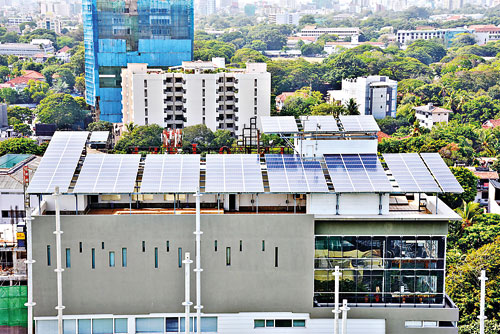CEB delays payments for solar power net accounting customers

File picture of solar panels on a roof top.
Sri Lanka’s solar power consumers enrolled in the net accounting system of receiving payment for the power they generated are getting burned not physically but mentally as the Ceylon Electricity Board (CEB) is yet to pay for their energy contributions to the national grid.
Although the Ministry of Power and Renewable Energy launched this net accounting system in December 2016 following cabinet approval, the CEB has failed to make payments during the past three months as promised under the new scheme, customers complain.
Under this new ‘net accounting’ system, those with solar panels were to be paid Rs.22 per unit during the first seven years for excess power supplied to the grid. From year eight onwards, they are to be paid Rs. 15.50 per unit. Customers who have already installed solar panels on their roof tops making substantial investments or obtaining bank loans are waiting without any return on their investments as promised by the government, a disgruntled customer told the Business Times.
The cheapest entry-level home solar panel installation costs over Rs.200,000 and a large number of people have already installed solar panels to get benefits under the new scheme, he added.
The CEB has the money to make these payments to solar power consumers but the necessary accounting system is still not in place to implement this programme, a senior CEB Official told the Business Times. Admitting the fact that there was a delay in the payment to solar power consumers, he said ‘the matter of introducing the accounting system would be settled by the CEB”, without mentioning as to how long it will take to settle the matter.
He noted that at present, 28.67 Giga watt hours (GWh) are produced in the country using solar energy and citizens who have installed solar cells in their homes or at commercial buildings produced and contributed 78.05 Mega Watt hours (MWh) to the national grid on a daily basis.The CEB has granted relief to its consumers who generate electricity using solar power and add it to the national grid.
Although the selling price of a unit of electricity was Rs. 15.80, the CEB has pledged to pay Rs. 22 per unit (Kwh) added to the national grid by producing from solar cells. He said adding that it purchases electricity generated using solar power without imposing limitation.A relief for loan interest was provided to customers for the installation of solar power plants on their roof tops, he revealed.
At the moment, CEB implements a system where units of power produced by solar energy are deducted from the total electricity bill of consumers.Any excess power, however, is not settled in cash but carried forward for up to 10 years.Last year, the cabinet of ministers approved a proposal to pay users for excess power generated under a 20-year contract.At present, installing 1 kWh of solar generation capacity costs around Rs.200,000. Investing this money upfront will only make sense for those consuming 200 kWh or more, an energy expert said adding that under the current, multi-tier tariff system, those consuming up to 30 units of electricity a month pay Rs. 7.85 per unit, while those above 180 units have to pay Rs. 45 per unit.
According to CEB data, a kilowatt of electricity generated using solar panels costs Rs. 23 while an average coal-generated kilowatt costs Rs. 15.The Ministry of Power and Renewable Energy has launched this new community based power generation project titled ‘Soorya Bala Sangramaya’ (Battle for Solar Energy) in collaboration with Sri Lanka Sustainable Energy Authority, CEB and Lanka Electricity Company (Pvt) Ltd to promote the setting up of small solar power plants on the rooftops of households, religious places, hotels, commercial establishments and industries.It is expected to add 200 MW of solar electricity to the national grid by 2020 and 1000 MW by 2025 through this initiative.


